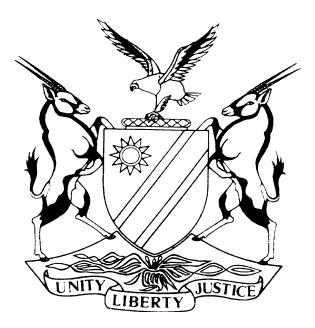REPUBLIC OF NAMIBIA

HIGH COURT OF NAMIBIA NORTHERN LOCAL DIVISION
HELD AT OSHAKATI
REVIEW JUDGMENT
Case no: CR No.:11/2020
In the matter between:
THE STATE
v
JOHANNES PETRUS ACCUSED
Neutral citation: S v Petrus (CR 11/2020) [2020] NAHCNLD 25 (13 February 2020)
Coram: JANUARY J et SALIONGA J
Delivered: 13 February 2020
Flynote: Criminal Procedure – Review – Plea – Section 112 (1) (b) of Act 51 of 1977 questioning – Offence – Assault with intent to do grievous bodily harm – Accused not questioned of his intention – Court convicted accused after drawing inferences from accused’s answers – Questioning which amounts to a replication of what appears in the charge sheet fell short of the standard required – Same should be discouraged at all cost – Court should be satisfied that accused answers establish unequivocal plea of guilty to the offence charged.
ORDER
Consequently the following order is made:-
1. The conviction and the sentence is hereby set aside;
2. The matter is referred back to the magistrate court of Ondangwa to start de novo before a presiding officer different from the one that presided in this matter.
REVIEW JUDGMENT
SALIONGA J (JANUARY J concurring):
[1] The accused was charged with assault with intent to do grievous bodily harm. He pleaded guilty to the charge and was consequently convicted pursuant to section 112 (1) (b) of Act 51 of 1977. He was sentenced to N$4000 or 18 months imprisonment of which N$2000 or nine months imprisonment is suspended for a period of five years on condition that the accused is not convicted of assault with intent to do grievous bodily harm committed during the period of suspension.
[2] A queried was directed to the learned magistrate regarding the manner in which the inquiry was held. In other words, how did the learned magistrate satisfy that the accused admitted all the elements of the offence if no question was asked during questioning regarding his intention to do grievous bodily harm?
[3] The learned magistrate in her response referred the reviewing judge to the following questions;
‘The state alleges that you wrongfully, unlawfully and intentionally assaulted Lusian Mingeli by stabbing him on the upper right arm with a knife with intent to cause the said Lusian Mingeli grievous bodily harm. Do you admit or deny this? To which the accused responded that he admits.’
‘Why did you assault the complainant in that manner? To which the accused responded; I stabbed him because he told people in the location that I assaulted someone.’
[4] According to the learned magistrate the above responses by the accused indicate his intention to commit the offence at hand. Based on those responses, the court a quo was satisfied and thereafter convicted the accused.
[5] The relevant provisions of section 112(1) (b) of the Criminal Procedure Act 51 of 1977 reads as follows:
‘(b) the presiding judge, regional magistrate or magistrate shall, if he or she is of the opinion that the offence merits punishment of imprisonment or any other form of detention without the option of a fine or of a fine exceeding the amount determined by the Minister from time to time by notice in the Gazette, or if requested thereto by the prosecutor, question the accused with reference to the alleged facts of the case in order to ascertain whether he or she admits the allegations in the charge to which he or she has pleaded guilty, and may, if satisfied that the accused is guilty of the offence to which he or she has pleaded guilty, convict the accused on his or her plea of guilty of that offence and impose any competent sentence.’
[6] As seen from numerous decisions of the High Court divisions, it is generally accepted that the duty of a judicial officer in terms of this section are twofold:
to question the accused with reference to the alleged facts of the case in order to ascertain whether he admits the allegations in the charge; and
to satisfy himself that the accused is guilty of the offence of which he has pleaded guilty.1
[7] It is inadequate for the court simply to ask whether the accused admits the allegations in the charge. The court must be certain that the accused understands what such admission entails. Equally questions such as;
‘the state alleges that you wrongfully, found unlawfully and intentionally assaulted Lusian Mingeli by stabbing him on the upper right arm with a knife with intent to cause the said complainant grievous bodily harm’ presupposes legal knowledge on the part of the unrepresented accused. Such questions amounts to a replication of what appears in the charge sheet and fell short of the standard required in the application of this section. They should be discouraged at all cost.
[8] In my view, the manner in which the presiding officer conducted the inquiry, fails to take cognizance of the purpose underlying the provisions of s 112(1) (b) of the Criminal Procedure Act, Act 51 of 1977 and does not adequately appreciate the specific intent required before a conviction of the crime of assault with intent to do grievous bodily harm may follow.
[9] Consequently the following order is made:-
1. The conviction and the sentence is hereby set aside;
2. The matter is referred back to the magistrate court of Ondangwa to start de novo before a different magistrate from the one who presided in this matter.
________________
J T SALIONGA
JUDGE
I agree
________________ H C JANUARY JUDGE
1(Mkhize v The State and another 1981 (3) SA 585 (N); Heugh, Dingele, Mlindeshweni, Mtyalelwa 1998 (1) SACR 83 (E); S v Gwenya 1995 (2) SACR 522 (E).